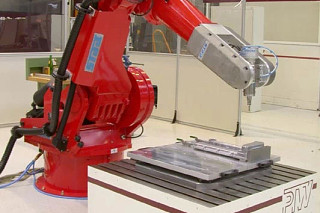Change Language :

ADVOCUT
Darmstadt University of Technology
Precision and excellent quality save time and money

Precise milling work is to be automated with ADVOCUT.
Surface work on large, difficult-to-access workpieces is often carried out by labourious manual work. The ADVOCUT project (funded by the Federal Ministry of Education and Research) aims to change this. In future, light milling tasks are to be fully automated. ADVOCUT is being developed for serial use, for example in spare parts production. This will enable companies to organise cost-, personnel- and time-intensive processes much more economically and save time and money in the long term.
The focus of the student team's research and design work is on maximising accuracy. "Not an easy endeavour," as Michael Kulok, a member of the Institute for Production Management, Technology and Machine Tools at TU Darmstadt, reports. However, he is convinced that an efficient machine will be developed by the end of the project in September 2006.

No wear despite soiling.
The biggest challenge for the research team from Darmstadt is to combine the advantages of the robot-like, fully serialised design with the benefits of conventional machine tools. Flexibility, quality of movement and precision must be combined in the new machine tool concept.
igus® triflex® R C70 came into play when it was necessary to protect the cables running outside the robot while at the same time ensuring maximum flexibility. With triflex® R C70, the students were spot on. The extremely flexible energy chain not only offers protection against dirt. It is also predestined for multi-axis rotations. Despite high speeds and intensive use, the wear remains extremely low, which brings the students a whole lot closer to their partial goal of cost savings despite versatile use.
You can find more interesting applications from a wide range of areas here
Consulting
I look forward to answering your questions
igus® GmbH+49 2203 9649-0Write e-mail
Shipping and consultation
In person:
Monday to Friday from 7 am - 8 pm.
Saturdays from 8 am- 12 pm.
Online:
24h
WhatsApp-Service:
Montag – Freitag: 8 – 16 Uhr